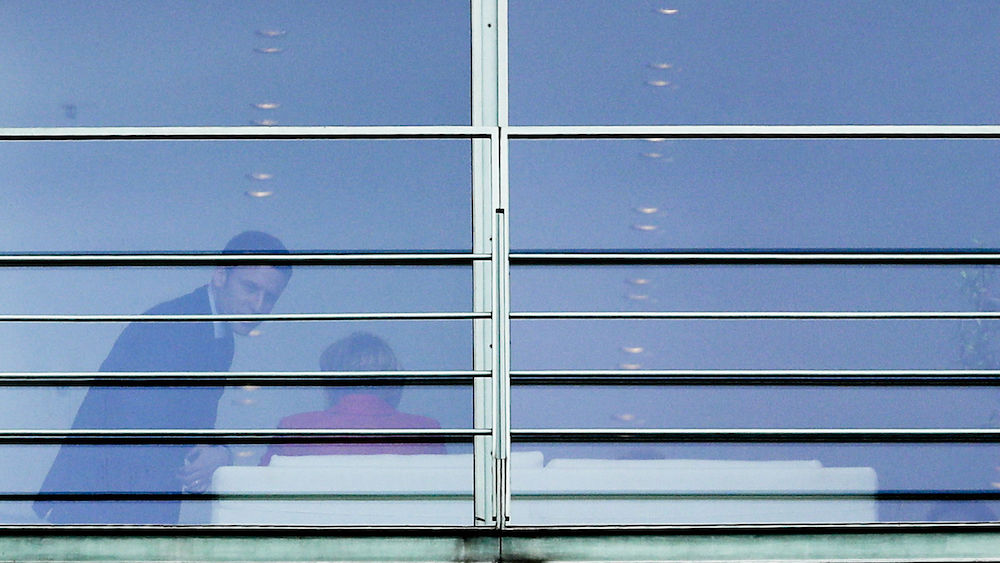Over her long time in office, the German chancellor has proven that she can work reasonably well with whoever occupies the Elysée Palace in Paris. But with France’s new president, the stakes are higher than ever before.
It has now been five years since Germany’s long-serving chancellor Angela Merkel last received a new French president.
On May 16, 2012, after a very long first day in office, a tired and somewhat frazzled François Hollande arrived at the Berlin chancellery. Merkel was waiting outside with her guard of honor.
Hollande, lacking experience in protocol, headed the wrong way twice on the red carpet that had been rolled out for him. Both times Merkel nudged him discretely by the elbow to redirect his steps. With small, barely noticeable gestures, she put him on the right path.
Merkel can be very gracious, too. This past Monday, one day after Emmanuel Macron celebrated his sensational election victory, she invited Hollande to Berlin for a last dinner á deux. Merkel wanted to thank the outgoing president “for the close cooperation during the last five years, for a good chapter of Franco-German friendship, for working together very intensely,” as a spokesman said.
In fact, Merkel has worked intensively with several French presidents during her twelve years in office.
Her very first official visit abroad back in 2005 brought her to Paris, where Jacques Chirac warmly received her in the Elysée Palace. With Chirac’s successor, Nicolas Sarkozy, she fought over defense and public finances, but ended up working so closely that the duo received the nickname Merkozy. Merkhollande also turned out to be a success after an initial period of tensions.
It was over the euro crisis (Sarkozy) and Russia’s invasion of Ukraine (Hollande) that the Franco-German couple came together. Acting together, they proved far more effective than either would have been individually. And productive cooperation side, Merkel has another reason to welcome French involvement: it allays fears of Germany hegemony in Europe.
Will we now see Merkcron? Are France’s new young President Emmanuel Macron and the enormously experienced German Chancellor Angela Merkel going to be Europe’s new dream team? In both countries, there are those who hope that Macron and Merkel will restart the long-dormant Franco-German motor for European integration and reform.
First, however, both will face elections soon. Macron needs to win parliamentary support at the polls for the National Assembly in May and June; Merkel has a good chance of being returned for a fourth term at the Bundestag elections in September. Before then not much will be possible to achieve in terms of substance.
This is all the more true as Macron’s ideas for reforming the eurozone put him much closer to Merkel’s main political rivals, the Social Democrats, led by Martin Schulz, the former president of the European Parliament.
Macron has bold proposals for introducing a eurozone finance minister who would be master over a substantial budget. This would demand rewriting the European treaties. Merkel, given past painful experiences with referenda in the EU, is skeptical.
Macron also wants to introduce eurobonds to jointly guarantee public debt in the eurozone, which Germany has consistently opposed. Berlin does not want to be saddled with the debt of countries that then would have little incentive to keep their public finances in order.
Assuming Merkel is re-elected, she will first want to see how her new French counterpart performs setting domestic reforms in motion. Macron, the youngest French president ever at 39, has promised ambitious labor market and public sector overhauls. During his campaign, he has shown that he can be persistent and has luck on his side, but he will need lots more of both to succeed in office.
Still, Merkel will find it much harder to refuse Macron than any of his predecessors, for three reasons in particular.
First, the new president’s economic reforms are much closer to the German model and therefore more credible to German minds. Second, Germany has a vested interested in the revival of its largest neighbor. Seven years into the euro crisis, public opinion in Germany is also coming to accept that more spending may be necessary to help growth in Europe pick up.
Third, and most importantly, Macron has won a great victory against nationalistic, populist, anti-European forces in the form of Marine Le Pen and her extremist Front National party. If Le Pen had won, a collapse of the euro and possibly the EU could have followed. Politically and economically, Germany is the country in Europe that can least afford a return to nationalism. Macron, with his positive, pro-European campaign message, saved the day for the EU, and for Germany in particular.
With Chirac, Sarkozy, and Hollande, Merkel has proven that she can build a good relationship with any French president. She has the skill, the tact, and the grace needed to work with the leaders of a nation that is both proud of its history and afraid of its decline.
But most importantly, Merkel knows what is at stake: if Europe is to survive and prosper, she must help Macron make a success of his presidency.







